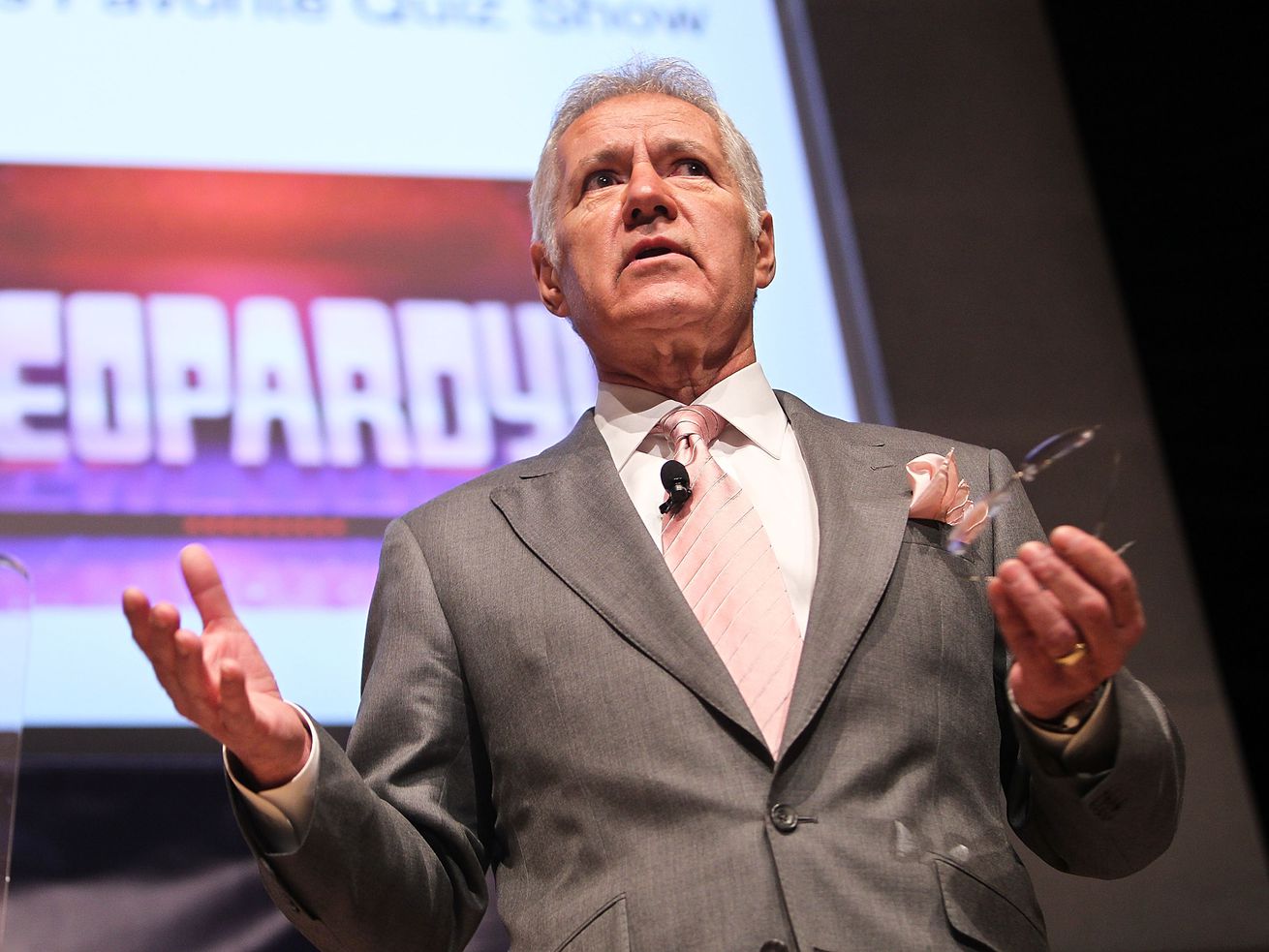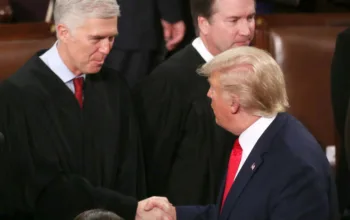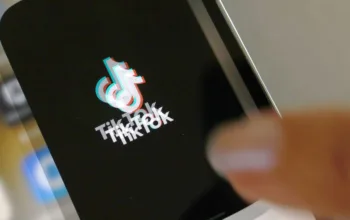Jeopardy is a wholesome American icon. Its Mike Richards crisis may change that.
In the end, Jeopardy executive producer Mike Richards was the face of the legendary quiz show for approximately one day.
After a year of guest hosts, some of whom were backdoor-auditioning for the job of permanent host after the death of Alex Trebek last November, Richards drew confusion and backlash when news broke on August 11 that he would be stepping up to take the gig.
In comparison with more prominent candidates like legendary Jeopardy contestant Ken Jennings and superfan LeVar Burton, Richards had zero name recognition outside Jeopardy viewers who’d watched him helm a few episodes as part of the show’s parade of guest hosts earlier this year. The casting news immediately spawned the Jeopardy in-joke “Who Is Mike Richards?”
Though Richards has only been a Jeopardy producer for one tumultuous year, he’s a game show industry veteran who seems to have long-held aspirations of hosting a game show, any game show, himself. That ambition may have led him to pursue the chance to host Jeopardy once the opportunity presented itself.
But to a mostly unfamiliar public, Richards’s seemingly out-of-nowhere ascension predictably fueled a rising tide of dissatisfaction and scrutiny, which then spurred discussion of trouble in his past. The Ringer published an exposé painting Richards as an opportunist with a history of making sexist, classist, and xenophobic remarks and detailing discrimination lawsuits made during his tenure at The Price Is Right. Very quickly, Richards looked unfit to continue the legacy of Jeopardy.
On Friday, August 20, he confronted that reality: Richards announced that he would be stepping down as host after a single day of taping the show — meaning the drawn-out search for a new permanent host to replace the late, beloved Trebek will continue a little while longer. (Actress Mayim Bialik will step in for now.)
So: Who is Mike Richards, and how did he land, then lose, such a coveted job? His rise and fall feels almost scripted: A powerful man seems to override a fair selection process, then succumbs to scandal due to the skeletons in his closet. But this familiar story can tell us plenty about Jeopardy and its cultural role — and what might be next for the show itself.
Richards’s years of industry experience may have worked against him
Mike Richards became executive producer of Jeopardy a year ago, after the departure of longtime executive Harry Friedman at the end of the show’s 2019–2020 season. A jubilant announcement about the switchover in August 2019 noted that Richards had programmed 4,000 hours of game shows during his career — a career that has seen Richards earn four Daytime Emmy awards and 19 nominations.
According to an alumni profile from Pepperdine University, the 46-year-old Richards began hosting a college TV show in the mid-’90s — The Randumb Show, described as “a weekly late-night sketch comedy talk show which won multiple college broadcasting awards.” Years later, Richards would revive a version of The Randumb Show in podcast form. But first, in 1997, as a new college grad, he leveraged it to gain an internship at The Tonight Show — and his career took off from there.
By the mid-aughts, Richards had moved from production assistant roles to hosting duties for reality shows like Beauty and the Geek. In 2007, he auditioned to host The Price Is Right before assuming the role of executive producer instead. He has also reportedly auditioned to host American Idol.
These industry experiences, especially his intermittent hosting roles, might have made him a veteran primed for the Jeopardy job, but once he was named host, they also made him look insincere to many Jeopardy fans. As past Jeopardy champion Kristin Sausville told the Ringer, “[I]t looks like Richards just wanted to host a game show, any game show.”
Outside of his short tenure as a producer, Richards lacked an intimate tie to Jeopardy or a long-professed love for the show. This made him an outlier among the many guest hosts who helmed Jeopardy since Trebek’s illness and death. Popular guest host Ken Jennings is a Jeopardy legend, the most-winning contestant in the show’s history. NFL quarterback Aaron Rodgers, a lifelong fan, prepared for his stint as host as intensely as if he were drilling for the Super Bowl. Fan-favorite Burton is a former Celebrity Jeopardy winner who’s been talking about his dream of hosting Jeopardy for nearly a decade.
Richards also came across to some viewers as a stand-in in other ways. As reported by the Ringer’s Claire McNear (a Jeopardy expert who published a book about the show in 2020), Richards may have pushed his way into guest-hosting the show earlier this year by seizing on a planned host’s scheduling conflict that the Ringer described as “minor.” In other words, Richards may have come up with a more-or-less artificial reason for him to take a spin as an emergency guest host, as if he were doing the show a favor by rescuing it from a crisis.
Regardless of how it came about, Richards’s perceived use of that temporary guest-hosting gig as a stepping stone to the permanent position looked like a power move. Richards seemed to be, in effect, crowning himself king.
Jeopardy was at pains to stress, in a press release issued August 11 that was later deleted, that the decision to elevate Richards was made not solely by him but rather “a senior group of executives at Sony Pictures Television,” based on “research from multiple panels and focus groups as well as input from the show’s partners and viewers.” Still, it’s difficult to align that insistence with audiences’ general ambivalence about his hosting performance, as a brutal Morning Consult poll after the announcement suggests.
The whole situation smacked of opportunism — traits hardly befitting a program like Jeopardy. After all, the game show originally launched in the ’60s as a more honest alternative to the scandal-laden trivia contests of the ’50s. In addition to the show’s “answer first, followed by the question” format serving as an antidote to more manipulative game show styles, Jeopardy has long generated a sense of unmatched community pride among its fans and contestants.
The show is a test of its audience’s intelligence and cleverness, and its egalitarian format makes it a microcosm of the American dream. The contest rewards anyone with a lot of knowledge and a little skill at making good bets, which is practically a template for how success in the US is theoretically supposed to work: On Jeopardy, we can see that fabled merit system reward nightly dividends.
The hosts are part of Jeopardy’s myth-making. In its decades-long run, the show has had only two main hosts — original host Art Fleming and longtime host Trebek, each with reputations that matched the show’s largely scandal-free record.
Given how leery many were of Richards’s selection, it was all but a given that his reputation and past history would be highly scrutinized to make sure they could live up to the reputation of Jeopardy itself.
Allegations soon surfaced regarding Richards’s behavior and comments toward women and minorities
After the news broke in early August that Richards was in talks to assume the role of host, media outlets began reporting on several decade-old lawsuits involving Richards and allegations of sexism.
One suit, filed by former The Price Is Right model Brandy Cochran against the show’s production team in 2010, saw Cochran win $7.7 million in damages after the court found the production team had discriminated against her and then fired her for getting pregnant. Amid other allegations, Cochran said that Richards, then one of the show’s producers, refused to interact with her on set after implying he should have fired her before her pregnancy announcement. She also claimed Richards had pushed for the models to wear skimpier clothing onstage and had made derogatory comments about women in swimsuits.
In another lawsuit filed alongside Cochran’s but later dismissed, The Price Is Right model Shane Stirling alleged that Richards joked that he’d fired five other models, only to be left with the one who had gotten pregnant.
Richards denied the allegations in court in 2012, and then denied them again this month, sending an internal memo to staff in which he insisted, “The way in which my comments and actions have been characterized in these complaints does not reflect the reality of who I am or how we worked together on The Price is Right.”
Richards’s reputation took another hit, however, as the resurfaced lawsuits joined with other unsavory comments that McNear uncovered for the Ringer. These originated in a 2013 podcast titled The Randumb Show, recycling the name but not the format of Richards’s original college sketch show. The podcast and all of its 41 episodes were deleted from its hosting platform on August 17, but as reported by McNear, many of them featured Richards voicing a litany of controversial opinions.
In one episode, he referred to “booth babes” — women who cosplay and promote products at industry conventions — as “booth whores,” among other epithets. In other episodes, he made jokes drawing on harmful anti-Semitic stereotypes, prompting the Anti-Defamation League to call last week for an investigation into his history.
In still more episodes, he mocked people on food stamps, welfare, and anyone who takes money from the government. He also dropped disparaging remarks about Haiti while discussing his guest’s apartment complex: “Does Beth live, like, in Haiti? Doesn’t it sound like that? Like, the urine smell, the woman in the muumuu, the stray cats.”
The Ringer noted that several times on the podcast, Richards praised figures like American Idol host Ryan Seacrest and Survivor host Jeff Probst — who, he claimed, have “actually made the world a safer place for what I like to call the ‘skinny white host,’ like [frequent game show host] George [Gray] and I. Which is, you’ll take a chance on someone that you don’t know.” Richards seemed to be implying that such hosts would make it easier for an unknown white man to be considered for future hosting gigs.
When it came to naming a new host for Jeopardy, Sony’s decision committee didn’t appear to want to take a chance on anyone but Richards. The only exception was offering a No. 2 spot to actress Mayim Bialik, who was slated to host future special primetime episodes and has now stepped in on weekdays. As late as the day before he stepped down, with backlash still growing, Richards went to work filming the new season, which was set to begin airing on September 13, 2021. He even responded to the Ringer’s investigation with a lengthy apology.
“It is humbling to confront a terribly embarrassing moment of misjudgment, thoughtlessness, and insensitivity from nearly a decade ago,” Richards said in a statement. “Looking back now, there is no excuse, of course, for the comments I made on this podcast and I am deeply sorry.”
Perhaps if Richards hadn’t already been widely perceived as a disingenuous crown-snatcher, his apology might have gone over better. Instead, within days, he was out.
The Jeopardy woes reminds us that a sterling reputation is difficult to uphold
On Friday, August 20, Richards announced through an official statement given to the Ringer’s McNear from Sony that he would be stepping down and that the studio would relaunch its search for a new host.
BREAKING: Mike Richards has stepped down as the host of Jeopardy! Official statement via Sony: pic.twitter.com/eJSwyBOXwN
— Claire McNear (@clairemcnear) August 20, 2021
While many fans reacted to the news with jubilance, others were wearied at the thought of another protracted search for a new host. It’s unclear whether Sony will draw from the existing pool of now-seasoned hosts it has courted all year or whether it will look further afield.
In either case, the rounds of guest-hosting will resume for now. And because Richards was only declared host for a week — and only spent one day actually taping new episodes — the schedule shouldn’t experience much, if any, delay.
Many fans seem firmly behind LeVar Burton becoming Jeopardy’s next host, with celebrities including Ryan Reynolds stepping in to comment on his fitness for the role. Meanwhile, while Bialik was a popular guest host, backlash has arisen against her selection alongside Richards, due to her history of making anti-vaccine statements, along with a 2017 New York Times op-ed on Hollywood sexual misconduct in which she warned women in the industry against behaving “flirtatiously” and “having others celebrate your physical beauty.” She later took to social media to apologize for the op-ed.
Other guest hosts have been the targets of scorn from fans because of their own less-than-stellar histories. As Daniel Feinberg wrote for the Hollywood Reporter, “Selecting somebody with Richards’ background of ambitious ickiness was an affront to Alex Trebek’s legacy of fundamental decency, but I’m still more offended by what Dr. Oz’s guest run did to the show’s legacy of intellectual honesty.”
Although it seems Richards will continue in his role as Jeopardy’s executive producer, some fans have called on him to resign from that job as well.
The result of this sequence of events is perhaps a reminder that pride goes before a fall, or at least before scorned game show fans rummage through your past to prove you are unworthy of wearing Jeopardy’s crown. It’s also a reminder that Jeopardy’s importance extends beyond that of the average game show. Because the program combines intellectual curiosity with meritocracy in a way that makes geekery seem fashionable, Jeopardy stands as America’s most popular and culturally significant game show.
Its mostly scandal-free legacy, then, is a big deal — not only because the show is so popular, but because Jeopardy might just be one of the few cultural cornerstones that still unites Americans, one whose moral integrity and significance we can all agree on despite our many other differences. Throughout its decades-long run, Jeopardy’s biggest controversies have not been so large — such as complaints about arrogant winners or card-shark contestant James Holzhauer, whose mathematical gameplay was condemned by many fans as ruinous to the game’s spontaneity and fun.
The Mike Richards saga has threatened that legacy, and in its aftermath, with so much on the line, any future host will need to have a reputation that lives up to that of Jeopardy itself.
They’ll not only have Alex Trebek’s giant shoes to fill — they’ll have to convince the public that they deserve to wear them.
Author: Aja Romano
Read More



